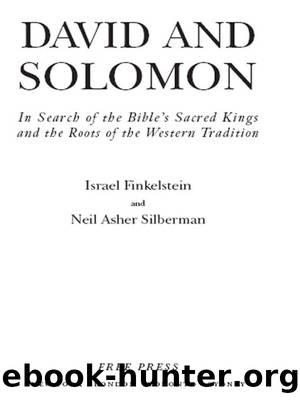David and Solomon by Israel Finkelstein & Neil Asher Silberman

Author:Israel Finkelstein & Neil Asher Silberman [Finkelstein, Israel]
Language: eng
Format: mobi
Publisher: Simon & Schuster, Inc.
Published: 2006-01-30T16:00:00+00:00
CREATING THE SOLOMONIC MYTH
The stories of Solomon in the Bible are uniquely cosmopolitan. Foreign leaders are not enemies to be conquered or tyrants to be suffered; they are equals with whom to deal politely, if cleverly, to achieve commercial success. The biblical tales of Solomonâs dealings with Hiram of Tyre and the queen of Sheba are literary acts of self-promotionâin trade negotiations, in diplomatic relations, in the status of the king. Solomonâs legend, first put into writing in the seventh century BCE, asserts Judahâs greatnessâand the essential skill of its monarchâin the brave new world of trade and cross-cultural communication of the Assyrian empire.
In ruling, administering, trading, and wisely judging his people, Solomon is presented as an ideal leader on the model of the Assyrian king: âAnd men came from all peoples to hear the wisdom of Solomon, and from all the kings of the earth, who had heard of his wisdomâ (1 Kings 4:34). âThus King Solomon excelled all the kings of the earth in riches and wisdom. And the whole earth sought the presence of Solomon to hear his wisdomâ (1 Kings 10:23â24). Even the extent of territory ruled by Solomonâin one version, from the Euphrates to Gaza (1 Kings 4:24)âreflects a vision of Assyrian kingship as the ultimate ideal. Though the dating of this verse is uncertain, the territory described is roughly equivalent to the western territories ruled by the Assyrian kings in the late eighth and seventh centuries BCE.
Closer to home, the Solomonic legend expresses nostalgia for the achievements of the fallen kingdom of Israel. Another description of the extent of Solomonâs kingdomâfrom Dan to Beer-sheba (1 Kings 4:25)âactually fits the borders of Judah and Israel combined. While the stories of David were used to refute the accusations of the northerners, the image of Solomon borrows heavily from northern royal traditionsânot refuting them but rather adopting them and depicting him as equal or even superior to the most powerful north Israelite kings. Just as they sailed the high seas in search of treasure; just as they traded in thoroughbred horses; just as they attracted the interest of the far-off Arabian kingdoms, so our cherished founding father Solomon had done on an even more massive and lucrative scale. Thus in addition to merging the cherished memories of the Israelites within the southern kingdom with the prestige of the Davidic dynasty, the Solomonic narratives were used to legitimize for all of Judahâs people the aristocratic culture and commercial concerns of the court of Manasseh that promoted Judahâs participation in the Assyrian world economy.
The Bibleâs composite vision of Solomonâs wisdom, commerce, and far-flung international connections has filled a thousand church windows and illustrated Bibles for centuries. While David was a man of war, Solomon was the prince of peace through diplomacy and trade. Solomonâs image promises security, stability, and happiness in a world in which boundaries are fluid and national glory is achieved through wisdom and commercial acumen.
Yet the circumstances that gave birth to this vision were not to last forever.
Download
This site does not store any files on its server. We only index and link to content provided by other sites. Please contact the content providers to delete copyright contents if any and email us, we'll remove relevant links or contents immediately.
It's Never Too Late by Kathie Lee Gifford(628)
The 9.9 Percent by Matthew Stewart(601)
Hebrews, James by George H. Guthrie & George H. Guthrie(586)
Take Back Your Time by Christy Wright(584)
Israel: Ancient Kingdom or Late Invention? by Daniel I. Block(558)
The New Oxford Annotated Bible with Apocrypha by unknow(556)
The Book Every Leader Needs to Read by 48 Authors(554)
Eating the Bible by Rena Rossner(544)
Insights on Hebrews by Charles R. Swindoll(542)
Psalms, Proverbs, Ecclesiastes, and Song of Songs by John W. Hilber & Tremper Longman III & Duane Garrett(524)
The Jew in the Lotus by Rodger Kamenetz(483)
Commentary on the Torah by Richard Elliott Friedman(473)
Judges: Volume Two by unknow(471)
Who Wrote the Bible? by Richard Elliott Friedman(461)
NKJV, Ignite, eBook by Thomas Nelson(440)
Proverbs, Ecclesiastes, Song of Solomon (Ancient Christian Commentary on Scripture) by J. Robert Wright(436)
Job, Ecclesiastes, Song of Songs by August H. Konkel & Tremper Longman III(436)
Commentary on James (Commentary on the New Testament Book #16) by Robert H. Gundry(436)
Reading the Bible with Rabbi Jesus by Tverberg Lois(411)
